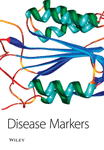Effects of Six Functional SNPs on the Urinary 8-Isoprostane Level in a General Japanese Population; Shimane COHRE Study
Abstract
Oxidative stress is an important risk factor for cardiovascular diseases. Although a variety of genetic factors are assumed to contribute to the regulation of oxidative stress, evidence in human populations is insufficient. In this study, we therefore evaluated the effects of six functional single-nucleotide polymorphisms (SNPs) on the oxidative stress under a cross-sectional study design. Participants of the health examination in two neighboring counties were recruited in a mountainous region of Shimane prefeture, Japan (n = 1092). As a marker for the oxidative stress, the urinary 8-isoprostane (IsoP) was measured by ELISA. The six SNPs were genotyped using the Taqman method. None of the SNPs showed a significant effect on the IsoP level. However, the Generalized Multiple Dimensionality Reduction (GMDR) method identified that the combination of the two SNPs, MTHFR C677T and eNOS T-786C, showed a significant effect on the IsoP level in this population. The linear regression analysis confirmed that the high risk genotype identified in the GMDR was an independent factor influencing the IsoP even after adjustment of confounding factors. This result suggested that GMDR analysis might be useful to identify concealed effects of combined SNPs.




